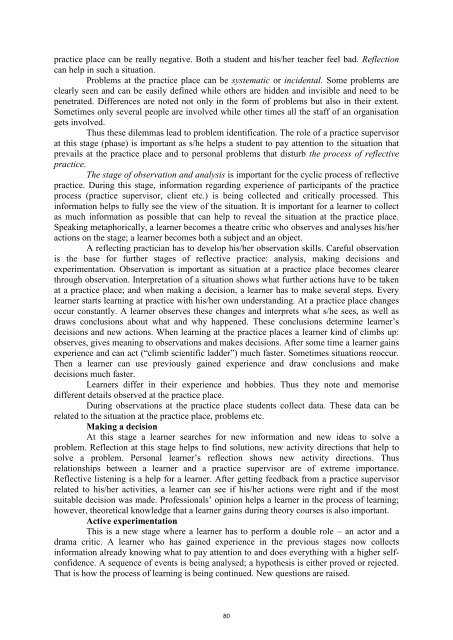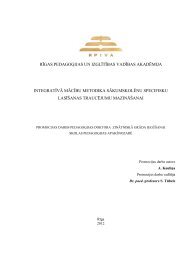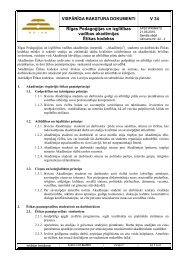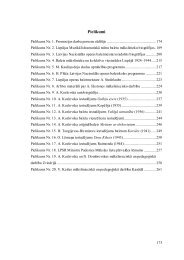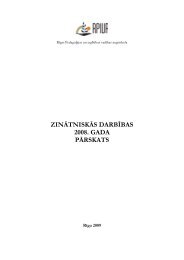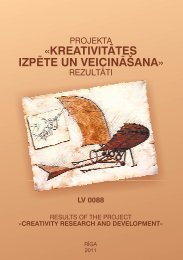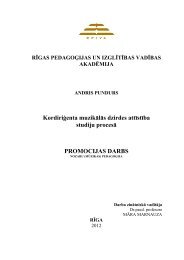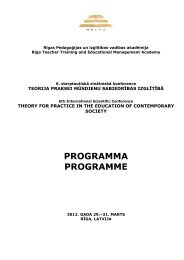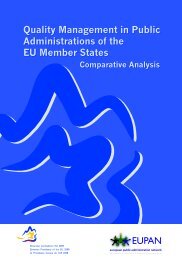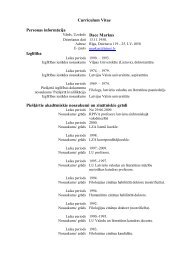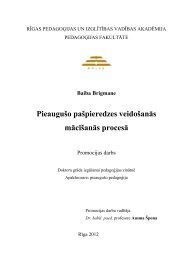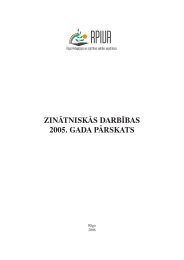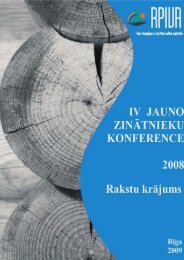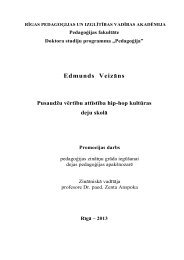saturs - rpiva
saturs - rpiva
saturs - rpiva
- No tags were found...
Create successful ePaper yourself
Turn your PDF publications into a flip-book with our unique Google optimized e-Paper software.
practice place can be really negative. Both a student and his/her teacher feel bad. Reflection<br />
can help in such a situation.<br />
Problems at the practice place can be systematic or incidental. Some problems are<br />
clearly seen and can be easily defined while others are hidden and invisible and need to be<br />
penetrated. Differences are noted not only in the form of problems but also in their extent.<br />
Sometimes only several people are involved while other times all the staff of an organisation<br />
gets involved.<br />
Thus these dilemmas lead to problem identification. The role of a practice supervisor<br />
at this stage (phase) is important as s/he helps a student to pay attention to the situation that<br />
prevails at the practice place and to personal problems that disturb the process of reflective<br />
practice.<br />
The stage of observation and analysis is important for the cyclic process of reflective<br />
practice. During this stage, information regarding experience of participants of the practice<br />
process (practice supervisor, client etc.) is being collected and critically processed. This<br />
information helps to fully see the view of the situation. It is important for a learner to collect<br />
as much information as possible that can help to reveal the situation at the practice place.<br />
Speaking metaphorically, a learner becomes a theatre critic who observes and analyses his/her<br />
actions on the stage; a learner becomes both a subject and an object.<br />
A reflecting practician has to develop his/her observation skills. Careful observation<br />
is the base for further stages of reflective practice: analysis, making decisions and<br />
experimentation. Observation is important as situation at a practice place becomes clearer<br />
through observation. Interpretation of a situation shows what further actions have to be taken<br />
at a practice place; and when making a decision, a learner has to make several steps. Every<br />
learner starts learning at practice with his/her own understanding. At a practice place changes<br />
occur constantly. A learner observes these changes and interprets what s/he sees, as well as<br />
draws conclusions about what and why happened. These conclusions determine learner’s<br />
decisions and new actions. When learning at the practice places a learner kind of climbs up:<br />
observes, gives meaning to observations and makes decisions. After some time a learner gains<br />
experience and can act (“climb scientific ladder”) much faster. Sometimes situations reoccur.<br />
Then a learner can use previously gained experience and draw conclusions and make<br />
decisions much faster.<br />
Learners differ in their experience and hobbies. Thus they note and memorise<br />
different details observed at the practice place.<br />
During observations at the practice place students collect data. These data can be<br />
related to the situation at the practice place, problems etc.<br />
Making a decision<br />
At this stage a learner searches for new information and new ideas to solve a<br />
problem. Reflection at this stage helps to find solutions, new activity directions that help to<br />
solve a problem. Personal learner’s reflection shows new activity directions. Thus<br />
relationships between a learner and a practice supervisor are of extreme importance.<br />
Reflective listening is a help for a learner. After getting feedback from a practice supervisor<br />
related to his/her activities, a learner can see if his/her actions were right and if the most<br />
suitable decision was made. Professionals’ opinion helps a learner in the process of learning;<br />
however, theoretical knowledge that a learner gains during theory courses is also important.<br />
Active experimentation<br />
This is a new stage where a learner has to perform a double role – an actor and a<br />
drama critic. A learner who has gained experience in the previous stages now collects<br />
information already knowing what to pay attention to and does everything with a higher selfconfidence.<br />
A sequence of events is being analysed; a hypothesis is either proved or rejected.<br />
That is how the process of learning is being continued. New questions are raised.<br />
80


